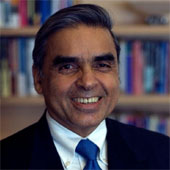The Islamic Renaissance
Why has the West yet to recognize the cultural rejuvenation taking place in the Islamic world?
April 18, 2008
If the Western mind finds it difficult to conceive of Chinese civilization emerging in an open and cosmopolitan way, it is now actually impossible for the Western mind to conceive of Islamic civilization reemerging as an open and cosmopolitan civilization.
Indeed, while many Western minds might reluctantly concede that some kind of cultural rejuvenation is taking place in China, none believes that any kind of cultural revival is taking place in the Islamic world. Islam seems to be moving backwards.
Yet a process similar to that in China is likely to be replicated in many Islamic societies. The Islamic world has a diversity of cultures — it contains not one but many rich and ancient civilizations. Arab Muslims (who founded Islam) now make up only one-sixth of the world’s estimated 1.5 billion Muslims.
Many leading Islamic statesmen have said that Muslim societies should take responsibility for their own weak economic performances.
At an Organization of the Islamic Conference (OIC) Summit in 2003, the former prime minister of Malaysia, Dr. Mahathir Mohammad (who has become infamous in the West for his anti-Western and anti-Israeli rhetoric), gave a speech to the Islamic heads of government that received a standing ovation — even though he was enormously self-critical of the Islamic world.
He said,
“We are now 1.3 billion strong. We have the biggest oil reserve in the world. We have great wealth. We are not as ignorant as the Jahilliah who embraced Islam. We are familiar with the workings of the world’s economy and finances.
We control 57 out of 180 countries in the world. Our votes can make or break international organizations. Yet we seem more helpless than the small number of Jahilliah converts who accepted the Prophet as their leader. Why? Is it because of Allah’s will or is it because we have interpreted our religion wrongly, or failed to abide by the correct teachings of our religion, or done the wrong things?”
A few years later, when King Abdullah of Saudi Arabia gave a speech to an Arab League meeting in Saudi Arabia in March 2007, he was equally self-critical:
“The question is: What have we done throughout these years to resolve all that [in Palestine, Iraq, Lebanon, Sudan and Somalia]? I do not want to blame the Arab League because it is an entity that reflects our conditions in detail, so the real blame should fall on us — we the leaders of the Arab nations.
Our permanent differences, our refusal to take the path of unity — all of that led the nations to lose their confidence in our credibility and to lose hope in our present and future.”
King Abdullah’s harsh indictment of Arab leaders “was taken by the Arabs as a breath of fresh air of self-criticism,” said Nabil Fahmy, Egypt’s ambassador to the United States.
This slow change is being propelled mostly by two things: a young population — 56% are twenty-five or younger — and growing media openness.
“Our media is much more open than it ever was in years past,” said Fahmy. “So you can’t hide the issues. The issues are out there. There is change in the Arab world. Serious change. Is it late? Yes. Is it slow? Yes. But there is change. We need to nurture it more. We need to be wiser.”
Unfortunately, in the West, particularly in the United States, most of King Abdullah’s speech went unnoticed, with the mainstream media focusing on the phrase “illegitimate foreign occupation.”
However, even though most thoughtful Muslim intellectuals acknowledge their own responsibilities and failures, they believe that the West has also contributed to their problems. Indeed, by any historical standard, the attitude of the Islamic world toward the West has never been more anti-Western. The global process of de-Westernization is taking place most powerfully in the Islamic world.
This, in turn, is freeing up a lot of political and cultural space. The Western assumption is that all this space will inevitably be filled up by radical and fundamentalist forces. In fact, the culturally ascendant forces in the Islamic world are not fundamentalist. Instead, the same forces of modernization that are sweeping through Asia are also sweeping through Muslim societies.
There is virtually no way that the March to Modernity could sweep through Asia without affecting the one billion Asians who are Muslims (only about two hundred million live in North Africa and Europe).
The proof that contemporary Muslim societies remain committed to modernization (and not Westernization) is provided by the nature of the governments of the Islamic world. Despite the advance of fundamentalist Islam, only one country in the Islamic world was seized fully.
The case of Afghanistan under the Taliban is clearly atypical and, by exception, illustrates the real direction of the Islamic world. The unique circumstances that allowed the Taliban to emerge have not been replicated.
Editor’s Note: This excerpt is adapted from THE NEW ASIAN HEMISPHERE by Kishore Mahbubani. Copyright 2008 Public Affairs. Reprinted with permission of the publisher.
Takeaways
The proof that contemporary Muslim societies remain committed to modernization (and not Westernization) is provided by the nature of the governments of the Islamic world.
The Islamic world has a diversity of cultures — it contains not one but many rich and ancient civilizations.
Unfortunately, in the West, particularly in the United States, most of King Abdullah's speech went unnoticed, with the mainstream media focusing on the phrase "illegitimate foreign occupation."
Read previous
How Muslims View the West
April 17, 2008
